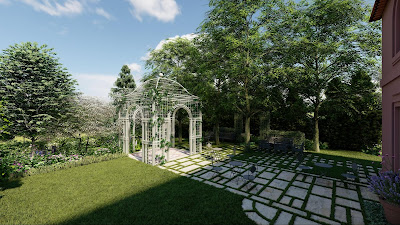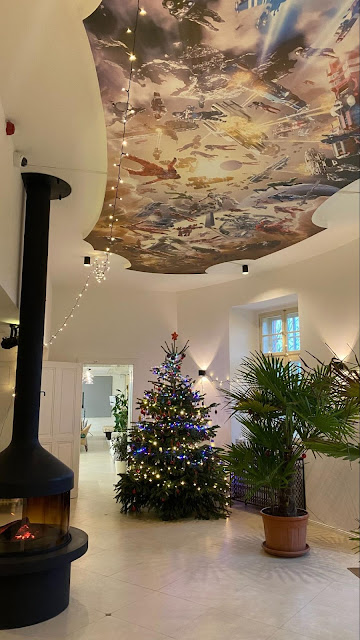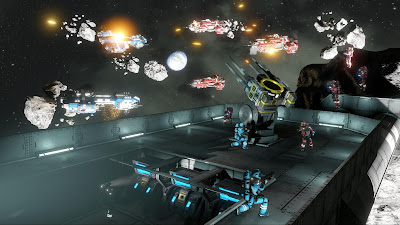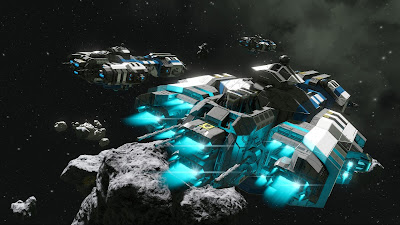SUMMARY:
- Keen team - significant growth
- Space Engineers - two major updates released
- AI Game - looking promising
- Memetic Badger
It is my tradition at the beginning of every year to publish a review of what we have achieved in the previous year, and what our plans are for the new one.
Review from last year (2020/2021) is here.
This year's review starts here. Enjoy!
Keen Software House
- In 2021, we proved that our studio is compatible with remote work and have continued to hire new team members from around the world.
- A growing team demands changes in structure, and so many of the veteran team members were promoted to leadership positions.
- Space Engineers: we released two major updates
- Warfare 1: our New Warfare series launched with Warfare 1: Field Engineer and engineer combat saw massive changes and updates - read more
- Heavy Industry: read more
- Cooperation with our community: Space Engineers has more than 440,000 items on Steam workshop. We started to support the UGC (User generated content) sharing in cooperation with the Tebex team.
- We added new official languages to Space Engineers: Italian, Brazilian - Portuguese, and Spanish.
- We launched regular promotional events on our www.SpaceEngineersGame.com website, which are always supported by regular live game streams run by Joel.
- Our programmers used Manual Badger architecture to evaluate parallelization techniques that would benefit the future development of Space Engineers. The ultimate aim of the investigation was to improve game performance to better leverage multi-core CPUs and GPUs. – article
- We launched an updated affiliate program in cooperation with Xsolla.
- We are dedicated for the continued development of Space Engineers on PC and Xbox
- We collaborated with Makeship and over 1100 community members got their hands on an exclusive Space Engineer plushie! https://www.makeship.com/products/space-engineers-plush
- We introduced crossplay and brought our Xbox and PC communities closer. https://blog.marekrosa.org/2021/02/space-engineers-community-crossplay.html
- We’ve been supporting our community playing on the platform of their choice by pushing simultaneous releases and regular updates to both platforms PC & Xbox.
- We are now continuing that series with Warfare 2: Broadside which focuses on massive changes to ship combat.
https://www.spaceengineersgame.com/new-players/warfare2-combat-guide/
GoodAI
GoodAI Research
Papers and blog posts
- Memetic Experiments for an Open-Ended Learning Paradigm - paper
- Building a research culture where we share questions and difficulties, not just answers - article
GoodAI Grants & EU Projects
- An Open-ended Environment for Lifelong Learning AI
- Bridging the Continual Learning Gap with Deep Artificial Neurons
- GPU Grant to Support TU Delft’s AI Research | GoodAI
- Using open-ended algorithms to generate video game content in Space Engineers
- Solving generalization and making artificial intelligence curious
- Bayesian Online Meta-Learning for continual & gradual learning
- Goodai enters into research collaboration to progress meta-learning and combinatorial generalization
- Creating a new framework for multi-agent AI systems
- A new kind of open-ended environment for a new kind of artificial intelligence
- Noether Networks: Meta-Learning Useful Conserved Quantities
- Generalization in Dexterous Manipulation via Geometry-Aware Multi-Task Learning
- Functional Regularization for Reinforcement Learning via Learned Fourier Features
- A large-scale benchmark for few-shot program induction and synthesis
- Discovering and Achieving Goals via World Models
- The VeriDream project is an international consortium of six organizations across Europe implementing AI into robotics. Significant progress was made on our case study applying quality diversity algorithms to control robotic legs.
- We are also part of iv4XR, a Horizon 2020 project that aims to build a novel verification and validation technology for Extended Reality systems based on techniques from AI to provide learning and reasoning over a virtual world.
Workshops & other news:
AI Ethics & Safety
- Inceptional UNESCO agreement on an ethical framework for AI development - article
- European Commission Report on Humans and Society in the Age of AI – article
- AI in the Czech Republic – Marek Rosa panel discussion with the Aspen Institute Central Europe.
- Cyborg Soldiers and Bioethics – Marek Rosa interview with GLOBSEC
- AI & Happiness Roundtable – Marek Havrda summarizes thoughts from the meeting – article
AI Game
- Iterated through numerous prototypes
- Developed a custom AI Engine
- Built a well-functioning team of professionals (10 and growing)
- Gained a lot of know-how and experience.
- The game is starting to be entertaining, but more iteration are needed
Oranžérie
- Pavilion in progress
- Space Engineers Apotheosis - more details
COVID
- GoodAI: 15
- Keen: 25
Personal
Plans for 2022
Keen Software House
- Space Engineers - New update - Warfare 2: Broadside - will be released soon
- Few more major updates to Space Engineers are planned for this year
- We have many surprises, especially on the technology side of Space Engineers & VRAGE. We will be talking about them soon.
GoodAI
- ICLR workshop: From Cells to Societies
- Memetic Badger - more work is needed, especially on integration between internal evolution inside the agent and the challenges of the external environment
- AI Game - I am looking forward to some of the technology advancements we are planning in the next months. Also, we will be growing our ‘language model / transformers’ team.
Best,
Marek Rosa
CEO, Creative Director, Founder at Keen Software House
CEO, CTO, Founder at GoodAI
For more news:
Space Engineers: www.SpaceEngineersGame.com
Keen Software House: www.keenswh.com
Medieval Engineers: www.MedievalEngineers.com
GoodAI: www.GoodAI.com
General AI Challenge: www.General-AI-Challenge.org
Personal bio:
Marek Rosa is the CEO and CTO of GoodAI, a general artificial intelligence R&D company, and the CEO and founder of Keen Software House, an independent game development studio best known for its best-seller Space Engineers (4 million copies sold). Both companies are based in Prague, Czech Republic.
Marek has been interested in artificial intelligence since childhood. He started his career as a programmer but later transitioned to a leadership role. After the success of the Keen Software House titles, Marek was able to personally fund GoodAI, his new general AI research company building human-level artificial intelligence.
GoodAI was founded in January 2014, with a $10 Million investment from Marek, it now has over 30 research scientists, engineers, and consultants working across its divisions.
At this time, Marek is developing Space Engineers, as well as leading daily research and development on recursive self-improvement based general AI architecture - Badger.









